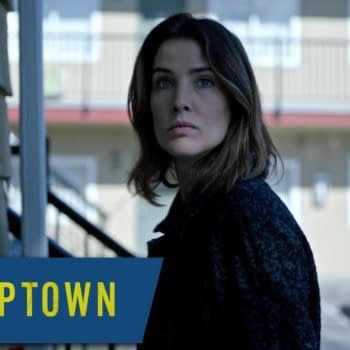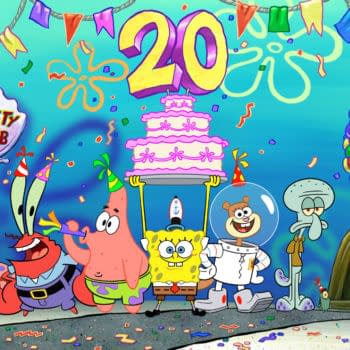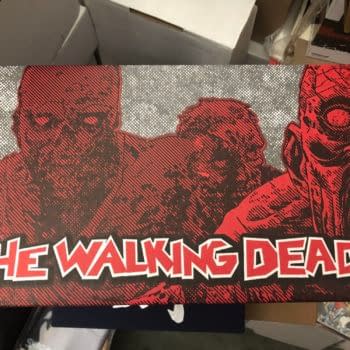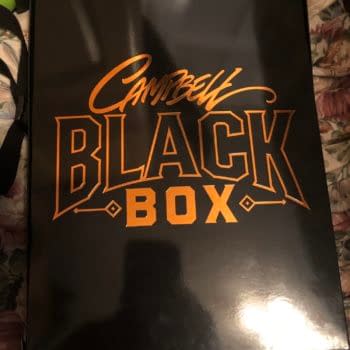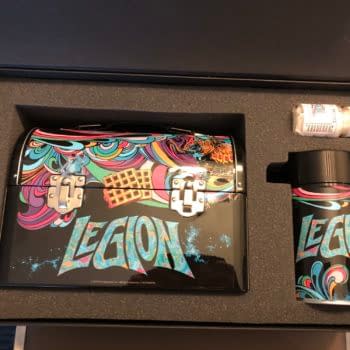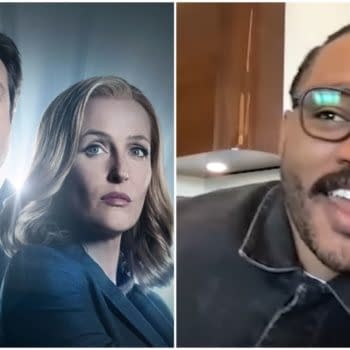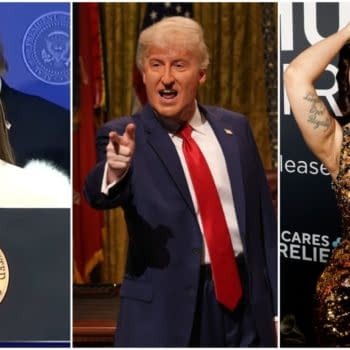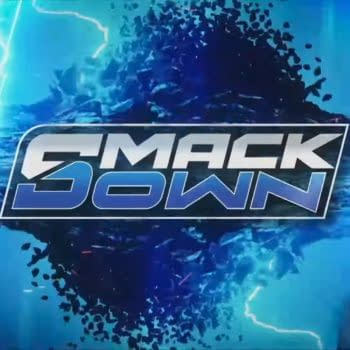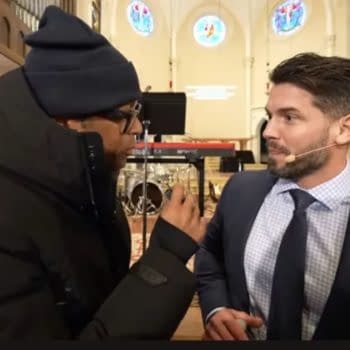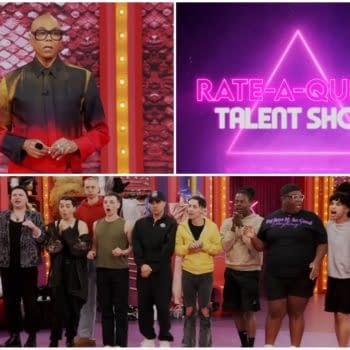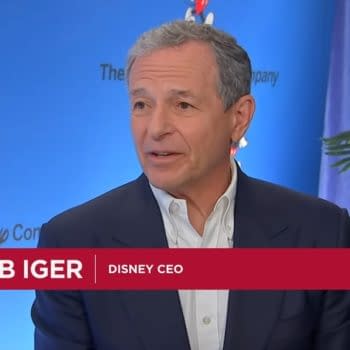Posted in: Recent Updates, san diego comic con, TV | Tagged: autism, clancy brown, HRL, Mr. Krabs, Mr. Lawrence, Nick, nickleodeon, Plankton, Roger Bumpass, spongebob, spongebob squarepants, Squidward, stop motion, tom kenny
The Cast Of SpongeBob SquarePants Discusses Why The Show Speaks To Autistic Kids
Sometimes you go into an interview expecting one thing and you end up with something completely different. This is what happened at SDCC this year when I interviewed the cast of SpongeBob SquarePants.
The Saturday morning of SDCC, I sat down with Tom Kenny (SpongeBob), Clancy Brown (Mr. Krabs), Rodger Bumpass (Squidward), and Mr. Lawrence (writer, story editor, and voice of Plankton). Also at the interview was another member of the media from a different website, and they asked the first question.
Journalist: What has changed since you were first on the air?
Tom Kenny: People watched cable.
Clancy Brown: On the TV.
Joshua Stone: Now they watch it on their phones.
TK: I see these animators breaking their backs, slaving for hours a day making everything look great so people can watch it on a screen this big (puts hands into the shape of a typical phone screen). "Wow, this looks awesome. What are you watching? Lawrence of Arabia, it's great. And 2001 is awesome." The world is so different, but SpongeBob and the comedy of SpongeBob and the characters are really the same. They are archetype characters that are kind of ancient comedy tropes. The naive guy, the bad guy, the greedy guy, the dumb guy, and the curmudgeon. Commedia dell'arte, as Clancy said earlier.
Roger Bumpass: One of the nice things about a long-running show, though, is that our characters can be fleshed out further and further. We all started a bit monotone. The singular in our character.
CB: (in his Mr. Krabs voice) Speak for yourself. I'm very expressive.
JS: First, I want to thank you all, because you helped me impress my kids.
All: You're welcome.
JS: Last year I interviewed Kareem Abdul-Jabbar and [my kids] were like, "I don't know who that is." It was great, but they couldn't care less. This year though I told them I'm going to interview SpongeBob, and they were like "You're going to interview Squidward, and Mr. Krabs, and SpongeBob, and Plankton?!" They were so happy.
TK: Oh, cool. Take that. (In SpongeBob voice) Suck it, Kareem Abdul-Jabbar.
RB: We enjoy raising the stock of people.
JS: Yes, thank you. I was talking to Clancy a little bit before actually and my boys are both autistic and I watch a lot of SpongeBob as a result. With my age, SpongeBob came on in 1999, when I was finishing grad school and I didn't watch the show, but now I watch a lot of SpongeBob. So I want to know why you think autistic kids relate so well to SpongeBob?
TK: Yeah, I have a lot to say about this, actually.
Mr. Lawrence: Yeah, it is a phenomenon.
TK: Somebody just came up to me yesterday on the floor and their kid was was quite severely autistic and 14 years old, but much younger obviously in other ways.
CB: SpongeBob connects at every level of the spectrum.
TK: Yeah. I think they like that character. He doesn't have a filter, he does what he wants. It comes up a lot actually, the autistic thing comes up, like at comic-cons and things like that. I've had people say "I didn't know if my kids understood words until I heard him laughing at a SpongeBob episode. Then I realized it." It's really heavy, like mind-blowing stuff where you're like wow, this thing, this product, this show that's just trying to be funny.
CB: But there's no guile in him, there is absolutely no guile. I think that's part of it too.
TK: Yeah, but it's funny, it's this thing where you're just trying to make something is diverting and makes people laugh and makes us laugh, but it's got all this other stuff that it can do. Obviously you're not thinking about that when you're making it, but once you put it out in the world it has different uses. And the autistic thing comes up so insanely often that I wish someone would write a term paper on it or a treatise on it.
It's really interesting, and I know autistic kids fixate on certain things and certain shows, but there' something about Spongebob and it's not just that SpongeBob is bigger than other shows, I don't know, I don't have a theory at all.
CB: It would be interesting to figure that out. The color scheme, maybe the music.
JS: It's like you said, there's no filter.
CB: There's no filter, there's no guile.
JS: Spongebob's a kid. He's a kid, he is what he is. And my kids, there 11 and 12, but there's a lot of ways there not 11 and 12. There's no filter. If something comes to their head, it's just going straight out.
TK: Yeah.
ML: That's what the spirit of the show is. It's silly. It's silly roles and kids connect to silly right away.
RB: There's a simplicity to it, not only in the gags and the words, but to the colors and the drawings that might appeal to autistic kids or adults also.
TK: Even though, obviously we're all autistic to a degree, especially in this business and animation I think being autistic is helpful to your skill set to some degree. Animation, drawing storyboards.
JS: You get hyper-focused.
TK: It's hyper-focused. My kid that wants to be an animator is probably slightly on the spectrum. We live in a world and work in a world where you have to watch yourself all the time. You can't do certain things, you have to be polite. Kids are always getting shutdown — don't say this, don't do that, shh, watch it, why did you do that. SpongeBob doesn't think about any of that, he just goes for it. They identify with that and maybe find it empowering to see a character on tv that does that, yet everybody finds likes everybody. SpongeBob has friends, SpongeBob has a life, SpongeBob has a pal.
CB: He's sweet.
TK: He's sweet, SpongeBob has a job.
JS: He's a pure character.
RB: We joke about this show being therapy for us, the way we have to do crazy things, but as it turns out, considering this very topic, it could be therapy for others. And I think you're right, a treatise should be done on this and it would be valid.
CB: (In Mr. Krabs' voice) Call the Mayo Clinic.
TK: SpongeBob is like an underwater therapy pet. He's like a therapy dogfish.
RB: We're a service cartoon.
TK: Don't pet me, I'm working.
JS: It's one of these things you can get a kid to calm down to.
TK: Or get wound up.
JS: Especially when the theme song starts. They just go.
TK: Yeah, I love it that after 20 years that theme song still gets kids wound up. Yeah!
ML: You'll see it if you go down to the panel today, when the lights go down and they start playing that song and it's kind of like a Pavlovian response: "Are you ready, kids?"
JS: If you just did that part and turned off the sound, the whole audience would do it, you wouldn't need to play the song.
ML: Which is crazy. That's crazy. That all by itself that idea that that everyone likes that we're still doing that. You get two seasons on something and then you're done. But we've got to play these guys, I've gotten to write this show for so long that it's almost an appendage; it's second nature. It's part of me in a way that my DNA, that if you removed it, I'd probably die.
CB: (In Mr. Krabs' voice) Easy with the appendage.
RB: I used to say that Squidward was my alter ego, but as the years have gone it's no longer alter.
ML: He's just Squidward.
TK: Roger Bumpass is Squidward's alter ego.
ML: I think we all are, to an extent, our characters, too. I think the reason we were the right people for these characters was because we've got something, there's something about each character we seem to embody in some way. My character Plankton is an evil jerk, but there's always a humanity in there and I relate to just the idea of being stepped on and shoved in the corner, "What about me?", that kind of thing. When you're an artist, you're working in it all, you're always "mine's good"; you're craving approval, so I relate to that part of it.
JS: After 19 years, you've achieved something most shows can't say. People who started watching you [as kids] now have kids that are watching you. When people come up to you, especially at conventions like this, how does that make you feel?
CB: I'm feeling like pretty soon we should be sold to Disney.
TK: With The Muppets and Marvel Superheroes.
CB: Here's the thing, with other multigenerational properties, the generations will argue over their particular generation of their properties. With SpongeBob they don't argue.
ML: There's no contention whatsoever.
CB: Your grandparents are going to watch the same ones that the kids are watching.
ML: Every age comes up to me and says "Oh my god, I watch you every day. Thank you for making my childhood great and now my kids are watching the same thing."
TK: That's pretty remarkable.
CB: Not everything has to be f****** reinvented.
TK: That is a mindblower. It's a very small number of actors that get to work on a show that has that. It's kind of like this weird Navy Seal club that we're in, "It's like I can take a guy's heart out of his body in seven seconds?", not many people get to say that.
JS: You, The Simpsons.
ML: It's us and The Simpsons.
RB: I guess that's it, huh.
TK: Artists and actors are just trying to get employed in something so they don't live under a bridge a push around a shopping cart with your stuff in it. Anything above that is gravy.
I was able to take a picture with the cast, and Brown asked what my sons' names were. Brown then said their names in Mr. Krabs' voice, and also he said his dog had the same name as one of my sons. When I played the audio back for my boys, it impressed them to no end.

I'd like to express my utmost appreciation to the people at Nickelodeon and the cast of SpongeBob for making this happen. Be sure to check out the new Halloween special, SpongeBob SquarePants: The Legend of Boo-Kini Bottom, this October! The special will actually be done as stop motion animation, similar to the Rankin/Bass holiday classics Rudolph the Red-Nosed Reindeer, Frosty the Snowman, and Mad Monster Party.
For further musings from Joshua Stone, you can follow him on the Twitter @1NerdyOne.



